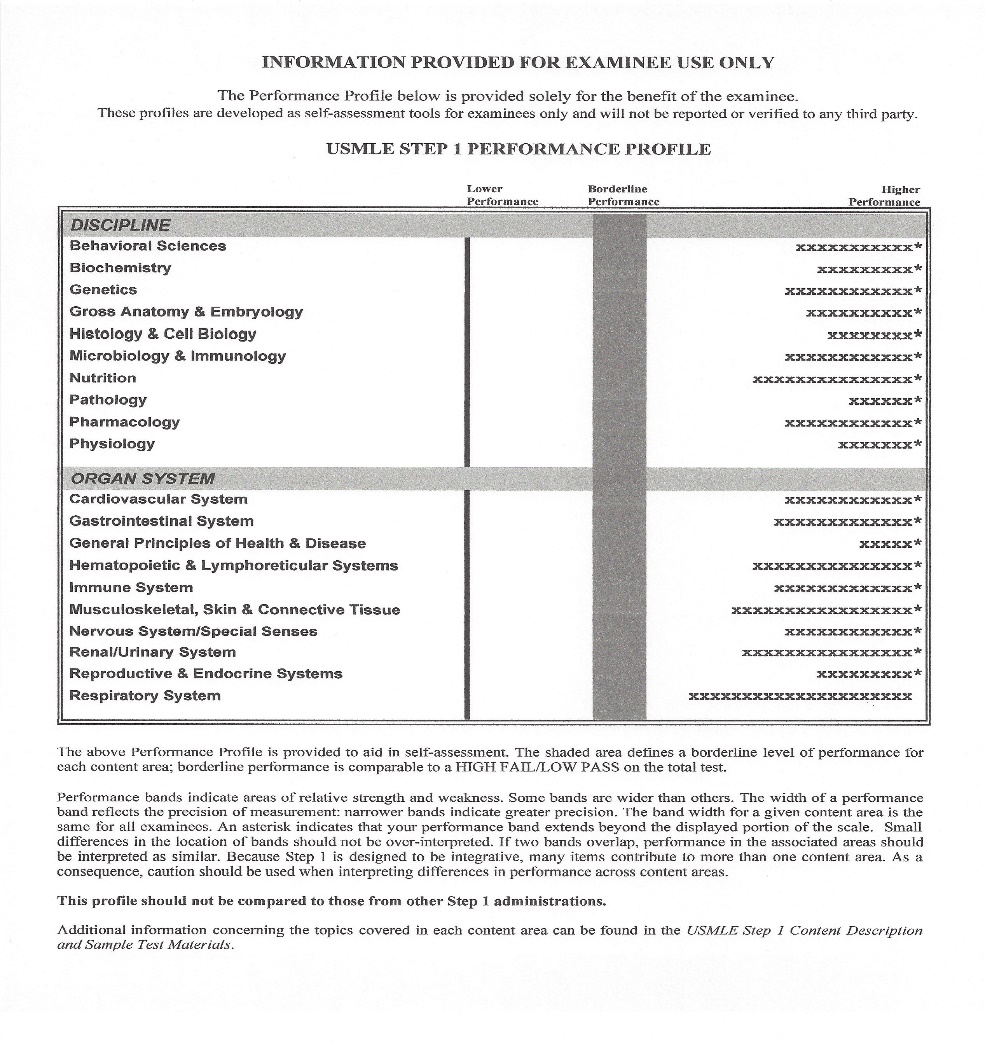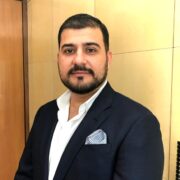
 The United States Medical Licensing Examination ® (USMLE®) is a three-step examination for medical licensure in the United States and is sponsored by the Federation of State Medical Boards (FSMB) and the National Board of Medical Examiners® (NBME®).
The United States Medical Licensing Examination ® (USMLE®) is a three-step examination for medical licensure in the United States and is sponsored by the Federation of State Medical Boards (FSMB) and the National Board of Medical Examiners® (NBME®).
The USMLE assesses a physician’s ability to apply knowledge, concepts, and principles, and to demonstrate fundamental patient-centered skills, that are important in health and disease and that constitute the basis of safe and effective patient care. Each of the three Steps of the USMLE complements the others; no Step can stand alone in the assessment of readiness for medical licensure.
The USMLE, formally the United States Medical Licensing Examination, is a famously challenging, three-step exam series that is required for anyone who wants to practice medicine in the United States. The first two steps of the series are typically taken while a student is still in medical school, while the third step takes place after graduation.
The main two parts are Clinical Knowledge (CK) and Clinical Skills (CS) test.
Test Score
Step 1, Step 2 CK, and Step 3 are each scored on a 1–300 scale. Students can compare scores for each step from year to year — that is, Step 1: 2016 scores to Step 1: 2017 scores — but not between the different steps.
Score reports for these three steps contain the following information:
If the student has passed or not, the minimum score needed to pass and the student’s three-digit score (which is the number most often quoted when students report their USMLE result)
Performance profile breakdowns for each testing category
Scores for Step 1, Step 2 CK, and Step 3 are generally available four weeks following the exam administration.
Now to understand the score we will consider 2015 records,
Minimum passing scores for 2015 were:
Step 1: 192
Step 2 CK: 209
Step 3: 190
Step 2 CS is only scored as pass/fail, and results for this step can take up to three months to be reported. You can find the Step 2 CS reporting schedule here.
Residency admissions committees, specialty boards, and state medical boards often ask for all scores.
USMLE scores are used in three major ways:
Most U.S. medical schools require students to pass Step 1 to graduate — and some also require that they pass Step 2/Clinical Knowledge (CK) and Step 2/Clinical Skills (CS) to receive their degree.
The scores from the first two steps (Step 1, Step 2 CK, and Step 2 CS) play an important part in assessing medical students for residency training positions in the U.S.
Passing the last step (Step 3) is required in order to be admitted into U.S.-based specialty boards, such as the American Board of Internal Medicine, but is also required by state medical boards that license doctors to practice in their specialty. (Boards are governing bodies that certify doctors at the state level, as well as in more than 150 specialties.)
Some common Facts about USMLE
Q. How much does it cost?
The fee may vary according to the respective year
USMLE Step Fees:
Step 1: $590
Step 2 CK: $590
Step 2 CS: $1250
Step 3: $815
Note that Prometric charges an additional fee for any appointment change — which could be a date, site, or cancellation — if it is made less than 30 days before the scheduled date of the exam. Moreover, there are also extra charges if a student requests an eligibility period extension or to sit for the exam at an international center.
Q. How can I register for USMLE test?
Registration for each USMLE step varies according to the test and medical school location. Step 1, Step 2 CK, and Step 3 (both days) are offered at Prometric test centers on multiple testing days. Students can sign up for each step up to six months in advance of the testing dates.
As mentioned earlier, Step 2 CS is offered in only five cities in the U.S. Once a student has applied for Step 2 CS, NBME/ECFMG assigns a 12-month eligibility period during which a medical student may take the test. Since test sites fill up quickly (usually four or more months in advance), students should schedule the test date before May 31 of the year assigned for this step. Moreover, students do not have their choice of location, but rather will be assigned to a test center in one of these five cities
.
Step 1, Step 2 CK, and Step 2 CS registration:
U.S. or Canadian M.D. or D.O. students/graduates can register at the NBME website
Non-U.S. medical school students/graduates can register at the ECFMG website
Step 3 Registration:
All graduates of any medical school who have passed Step 1, Step 2 CK, and Step 2 can register for Step 3 at the FSMB website
Q. Can I reschedule my USMLE exam?
Prometric will charge a fee if USMLE examinees change testing appointments (e.g., reschedule, cancel, change test center location) at Prometric Test Centers thirty or fewer days before their scheduled test date. No fee is charged for changing testing appointments 31 or more days prior to the first day of the scheduled test.
The date that you change your appointment, using local time at the Regional Registration Center for the Prometric Testing Region, will determine whether you pay a fee and the amount of this fee:
• If you change your appointment 31 or more days before (but not including) the first day of your scheduled test date, there is no fee.
• If you change your appointment fewer than 31 days but more than 5 days before (but not including) the first day of your scheduled test date, there is a $50 fee.
• If you change your appointment 5 or fewer days before (but not including) the first day of your scheduled test date, there is a higher fee. This fee varies by Prometric Testing Region and by exam.
Q. What is the eligibility for USMLE test?
Step 1, Step 2 CK, and Step 2 CS may be taken by any student who is enrolled in or has graduated from a:
U.S. or Canadian allopathic medical school accredited by the Liaison Committee on Medical Education (LCME), leading to an M.D. degree
U.S. or Canadian osteopathic medical school accredited by the American Osteopathic Association(AOA), leading to a D.O. degree
Medical schools outside the U.S. or Canada that are listed in the International Medical Education Directory (IMED) and that meet Educational Commission for Foreign Medical Graduates (ECFMG) criteria
Step 3 may be taken by:
Graduates of an accredited U.S. or Canadian allopathic or osteopathic medical school who have passed Step 1, Step 2 CK, and Step 2 CS
Graduates of a medical school outside the U.S. or Canada listed in IMED who have obtained certification by the ECFMG and passed Step 1, Step 2 CK, and Step 2 CS
Details about various sections
Although the USMLE is referred to as a three-step exam, it requires five days of testing. Moreover, with the introduction of Step 2 CS and a second day of testing for Step 3, preparation may actually need to be even more rigorous than in the past. Still, the consensus among medical professionals is that Step 1 is the hardest of the exams, and each subsequent step gets easier from there.
Below is a brief overview of each USMLE step (each of which I’ll be addressing in greater detail in upcoming articles).
Step 1
What is tested?: Ability to apply basic science concepts to medical practice
When is it taken?: Typically taken after the basic science years — that is, after the first two years of medical school
How long is the exam?: One day, 8 hours
How many questions are there?: 325 multiple-choice questions
What is the format?: Computer-based
Where can you take it?: Prometric test sites internationally
Step 2 CK (Clinical Knowledge)
What is tested?: Ability to apply clinical science knowledge in a supervised patient care setting
When is it taken?: Typically taken during the clinical years — that is, the third and fourth years of medical school
How long is the exam?: One day, 9 hours
How many questions are there?: 350 multiple-choice questions
What is the format?: Computer-based
Where can you take it?: Prometric test sites internationally
Step 2 CS (Clinical Skills)
What is tested?: Clinical skills applied to “ standardized patient” scenarios (that is, actors presenting symptoms or problems a typical doctor may encounter)
When is it taken?: Typically taken in the fourth year of medical school
How long is the exam?: One day, 8 hours
What are the length and format?: 12 patient cases, with 15 minutes for the patient encounter and 10 minutes to record notes for each case
Where can you take it?: Five test centers (Atlanta, Chicago, Houston, Los Angeles, and Philadelphia)
Step 3
What is tested?: Ability to apply clinical science to patients in an unsupervised patient care setting
When is it taken?: Typically following medical school graduation during residency training
How long is the exam?: Two days:
Day 1 – Foundations in Independent Practice (FIP)
Concepts tested: Scientific principles required for effective medical care
Duration of Day 1: One day, 7 hours
How many questions are there?: 260 multiple-choice questions
Day 2 – Advanced Clinical Medicine (ACM)
Concepts tested: Applying medical knowledge to patient management and evolving disease processes
Duration of Day 2: One day, 9 hours
How many questions are there?: 200 multiple-choice questions, 13 computer-based clinical simulations
Format of exam: Computer-based
Where can you take it?: Administered at Prometric test sites in U.S. and U.S. territories
Some important things to note:
Here are a few odds and ends about the USMLE:
Step 1, Step 2 CK, and Step 2 CS may be taken in any sequence.
Step 3 can only be taken once a student has passed Step 1, Step 2 CK, and Step 2 CS.
Students can take the same exam up to six times.
No exam may be taken more than three times within a 12-month period.
Once a student has passed a step, she cannot retake it unless this is required to comply with the time limits of a medical licensing body.
Students with disabilities may request accommodations, although the USMLE has historically been very strict in approving these. Be sure to plan ahead and learn about the requirements in advance of registering for the exam.
Following might help you as well.
SETTLE ABROAD
Skilled Immigration
Study and Settle Abroad
How to find your first job in Canada
Top 7 colleges in Melbourne Australia
MBBS ABROAD
Medical Admissions
- MBBS Abroad
- MBBS in China
- MBBS in Georgia
- MBBS in Kazakhstan
- MBBS in Kyrgyzstan
- MBBS in Philippines
- MBBS in Ukraine
- MBBS in Russia
- MBBS in Armenia
- MBBS in Belarus
- MBBS in Nepal
- MBBS in Bangladesh





